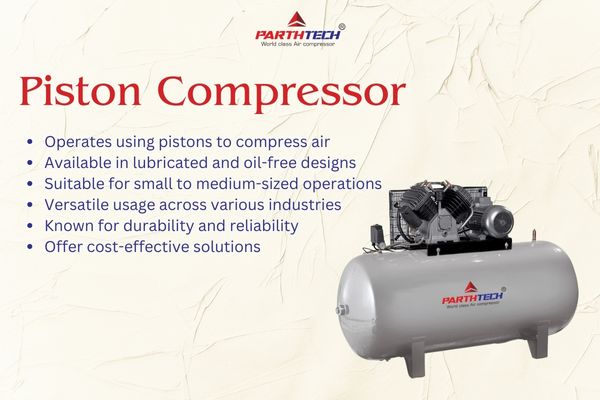-
Call
-
Whatsapp
9825014048
-
Location


Blog


BLOG

Choosing the Right Piston Compressor for Your Business Needs
In the intricate dance of industrial efficiency, one often underestimated performer steals the spotlight – the piston compressor. These workhorses play a vital role in various industries, but finding the right one for your specific business needs requires careful consideration. In this blog, we'll explore the key factors to help you choose the perfect piston compressor, ensuring it aligns seamlessly with your business requirements.
Understanding your Air Demand:
The first step in choosing a suitable piston compressor is understanding your business's compressed air demand. Assess the tools and machinery that rely on compressed air, considering required pressure levels, air volume, and duty cycle. This knowledge forms the foundation for selecting a compressor that meets your production demands without oversizing and wasting energy.

Types of Piston Compressors:
1. Single Stage Vs. Two Stage:
Single-stage compressors are suitable for applications with moderate pressure requirements, compressing air in one stroke.
On the other hand, two-stage compressors go through two compression stages, making them ideal for tasks demanding higher pressures.
2. Oil lubricated vs Oil free:
Oil-lubricated compressors provide smoother operation and increased durability but may not be suitable for applications requiring Oil-free air, such as in the food and pharmaceutical industries.
Oil-free compressors, designed for applications demanding clean and uncontaminated air, eliminate the risk of oil carryover.
Consider your Industry:
1. Manufacturing and Automotive:
For manufacturing and automotive applications, where precision and control are crucial, oil-lubricated compressors with efficient control systems may be the preferred choice.
2. Food and Beverage Production:
In industries with strict hygiene standards, such as food and beverage production, opting for oil-free compressors ensures the purity of compressed air.
3. Mining and Construction:
In rugged environments like mining and construction, choosing a robust compressor capable of withstanding dust, debris, and high temperatures is imperative.
Energy Efficiency:
1. Variable Speed Drives (VSD):
Compressors with VSD technology adjust their speed based on demand, contributing to significant energy savings by preventing unnecessary idling. >
2. Efficient Control Systems:
Selecting a compressor with an efficient control system ensures the unit operates optimally, minimizing energy consumption.
Maintenance Consideration:
1. Ease of Maintenance:
Consider the accessibility of components, ease of servicing, and availability of replacement parts when evaluating a compressor for your business.
2. Scheduled Maintenance Programs:
Opting for compressors with scheduled maintenance programs provided by manufacturers can ensure the longevity and reliability of your investment.
Conclusion:
Choosing the suitable piston compressor for your business is not a one-size-fits-all endeavour. When you are aware of your air demand and considering the type of compressor, you may make an informed choice, evaluating industry-specific requirements, prioritizing energy efficiency, and factoring in maintenance considerations. A carefully selected piston compressor becomes an invaluable asset, seamlessly integrating into your operations, boosting efficiency and powering your business toward success.


FAQs

Frequently Ask Questions
A piston compressor, or reciprocating compressor, utilizes the reciprocating motion of one or more pistons within a cylinder to compress air or gas. Air is drawn in by the piston's movement, creating a vacuum. The compressed air is released through an output valve as the piston rises. This compressed air is then used for various industrial applications.
Piston compressors are used in a wide range of industries, including manufacturing, automotive, mining, oil and gas, and food and beverage production. They are chosen for their adaptability, durability, and cost-effectiveness in meeting the compressed air requirements of these sectors.
Piston compressors offer several advantages, including cost-effectiveness, durability, and reliability. Compared to other compressor types, they have fewer moving parts, leading to easier maintenance and longer lifespans. Additionally, their adaptability allows them to cater to varying demands in different industrial processes.
Yes, the choice of a piston compressor depends on factors such as the required air pressure, volume, and the specific needs of the industrial application. Additionally, industries with strict hygiene standards, such as food and beverage production, may opt for oil-free piston compressors to ensure the purity of compressed air.
Piston compressors can be built to maximize energy usage with features like variable-speed drives and effective control systems. By adjusting their output based on actual demand, they contribute to energy efficiency and help reduce operational costs.
Regular maintenance is crucial for ensuring the optimal performance of piston compressors. This includes checking and replacing air filters, monitoring oil levels (for lubricated compressors), inspecting valves and seals, and scheduling routine inspections to address potential issues before they escalate.
